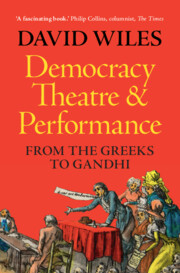Refine search
Actions for selected content:
50 results
Chapter 5 - Public Generosity and Models of Leadership in Classical Athens
-
-
- Book:
- Leadership in the Ancient World
- Published online:
- 14 September 2025
- Print publication:
- 16 October 2025, pp 110-132
-
- Chapter
- Export citation
26 - Women’s Voices in the History of English
- from Part III - Genre and Medium in the Record
-
-
- Book:
- The New Cambridge History of the English Language
- Published online:
- 18 October 2025
- Print publication:
- 16 October 2025, pp 637-662
-
- Chapter
- Export citation
Chapter 2 - John Thelwall and the Physiology of Speech
-
- Book:
- British Romanticism and the Matter of Voice
- Published online:
- 16 January 2025
- Print publication:
- 23 January 2025, pp 63-107
-
- Chapter
- Export citation
Chapter 10 - Hume on Eloquence and the Failings of English Political Oratory
- from Part III - Politics
-
-
- Book:
- Hume's <i>Essays</i>
- Published online:
- 02 January 2025
- Print publication:
- 09 January 2025, pp 187-204
-
- Chapter
- Export citation
Chapter 7 - Richard Simon and the Limits of Erudition
-
- Book:
- The Limits of Erudition
- Published online:
- 05 December 2024
- Print publication:
- 12 December 2024, pp 245-290
-
- Chapter
- Export citation
Chapter 3 - A Good Man Skilled in Speaking: Oratory and Rhetoric in Rome
-
- Book:
- A History of Latin Literature From its Beginnings to the Age of Augustus
- Published online:
- 14 November 2024
- Print publication:
- 21 November 2024, pp 75-109
-
- Chapter
- Export citation
Orating Origins: the Formation of Pakistan in Contemporary Urdu Shi’i Khitabat in Karachi
-
- Journal:
- Critical Pakistan Studies / Volume 1 / Issue 1-2 / May 2023
- Published online by Cambridge University Press:
- 19 September 2024, pp. 187-205
-
- Article
-
- You have access
- Open access
- HTML
- Export citation
Chapter 1 - Rhetoric in Athens
-
- Book:
- Democracy, Theatre and Performance
- Published online:
- 17 May 2024
- Print publication:
- 27 June 2024, pp 19-38
-
- Chapter
- Export citation
Chapter 1 - Gorgias of Leontini and Plato’s Gorgias
-
-
- Book:
- Plato's Gorgias
- Published online:
- 25 May 2024
- Print publication:
- 30 May 2024, pp 7-26
-
- Chapter
- Export citation

Democracy, Theatre and Performance
- From the Greeks to Gandhi
-
- Published online:
- 17 May 2024
- Print publication:
- 27 June 2024
Chapter 3 - Oratorical Ambiguity
-
- Book:
- Freedom and Power in Classical Athens
- Published online:
- 04 April 2024
- Print publication:
- 11 April 2024, pp 56-87
-
- Chapter
-
- You have access
- Open access
- HTML
- Export citation
Chapter 7 - Recognising the Best Physician
- from Part II - Case Studies
-
- Book:
- Medicine and Practical Ethics in Galen
- Published online:
- 14 December 2023
- Print publication:
- 04 January 2024, pp 174-193
-
- Chapter
-
- You have access
- Open access
- HTML
- Export citation
13 - Writing the First Sophistic
- from Part III - Receptions
-
-
- Book:
- The Cambridge Companion to the Sophists
- Published online:
- 23 December 2023
- Print publication:
- 19 October 2023, pp 370-402
-
- Chapter
- Export citation
Chapter 16 - Repetition in the Fragmentary Orators
- from Part III - Other Genres and Fragmentary Authors
-
-
- Book:
- Early Latin
- Published online:
- 27 July 2023
- Print publication:
- 17 August 2023, pp 327-350
-
- Chapter
- Export citation
Chapter 1 - Censorship as Cultural Production
- from Part I - Gender
-
-
- Book:
- The Censorship of Eighteenth-Century Theatre
- Published online:
- 03 August 2023
- Print publication:
- 17 August 2023, pp 33-51
-
- Chapter
- Export citation
2 - Establishing a New Genre
- from Part I - Context and Method
-
-
- Book:
- The Cambridge Companion to Thucydides
- Published online:
- 02 March 2023
- Print publication:
- 09 March 2023, pp 17-30
-
- Chapter
- Export citation
Chapter 9 - Towards a Definition of Sapientia
- from Part II - Political Philosophy and Ethics
-
-
- Book:
- Power and Persuasion in Cicero's Philosophy
- Published online:
- 15 January 2023
- Print publication:
- 05 January 2023, pp 205-217
-
- Chapter
- Export citation
4 - Documentary Poetics and the Literary Public Sphere
-
- Book:
- War, Communication, and the Politics of Culture in Early Modern Venice
- Published online:
- 15 January 2023
- Print publication:
- 05 January 2023, pp 156-194
-
- Chapter
- Export citation
Constructing the ‘theatre of power’: the performance of speeches of Emperor Leo VI the Wise
-
- Journal:
- Byzantine and Modern Greek Studies / Volume 47 / Issue 1 / April 2023
- Published online by Cambridge University Press:
- 09 December 2022, pp. 2-17
- Print publication:
- April 2023
-
- Article
- Export citation
Chapter 5 - Voluntas Populi
- from Part I - The Practice of Voluntas
-
- Book:
- Cicero and the People’s Will
- Published online:
- 24 November 2022
- Print publication:
- 08 December 2022, pp 105-144
-
- Chapter
- Export citation
